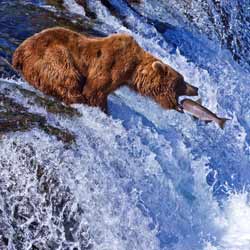FWS Working Conditions
Perhaps more than any other agency, the Fish and Wildlife Service offers its employees the satisfaction of hands-on contact with nature. FWS employees are directly responsible for protecting animals and their habitats, so they’re helping in the struggle between existence or extinction for America’s many endangered fish and wildlife species.

Yet, there are definitely some drawbacks to working in the outdoors, including long hours, exposure to the elements, and hard physical labor. Severe physical disabilities disqualify candidates from most positions that require strenuous physical work.
Fish and Wildlife Service jobs are generally located in refuges or field stations far away from large urban areas. You must be able to live and work closely with others in primitive conditions. This remoteness attracts many people to the Service, as it affords the chance to keep a journal, learn to play a musical instrument, and explore the wilderness. Hiking, boating, and even some hunting and fishing facilities are available to employees at many refuges.
Equipment and Clothing
Uniforms are often required, especially for personnel interacting with the public. You will be informed about uniform policies when offered a position. Non-uniform clothing will not be provided, so plan to bring:
- Heavy boots
- Jackets
- Gloves
- Sweaters
- Pants
- Rain gear, particularly if in the Pacific Northwest and Alaska.
Tools and special equipment will be provided.
Transportation
The cost of getting to your assigned station is not covered by the Fish and Wildlife Service, so you must have enough money to get yourself there. Travel between the station and field sites will be provided in many instances.

